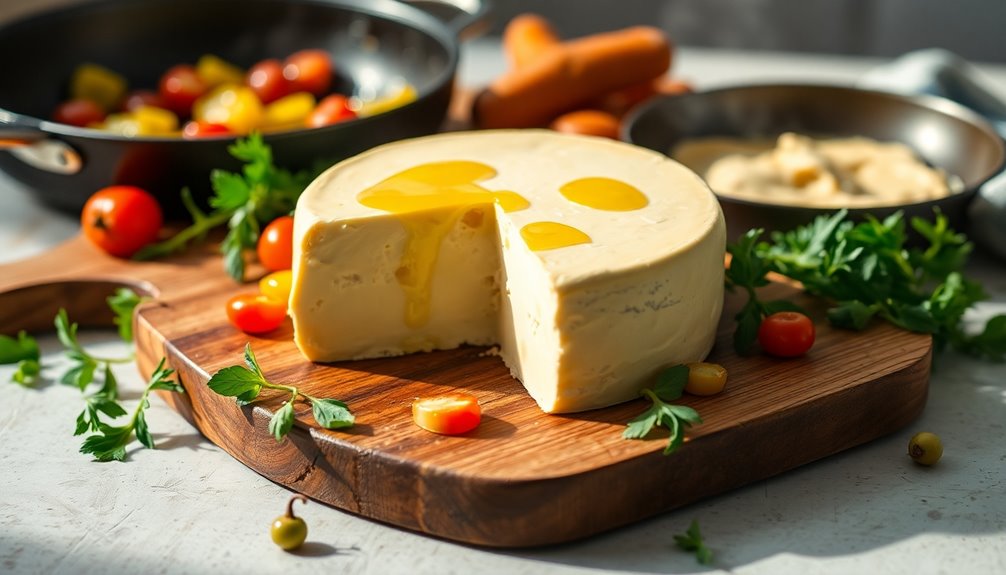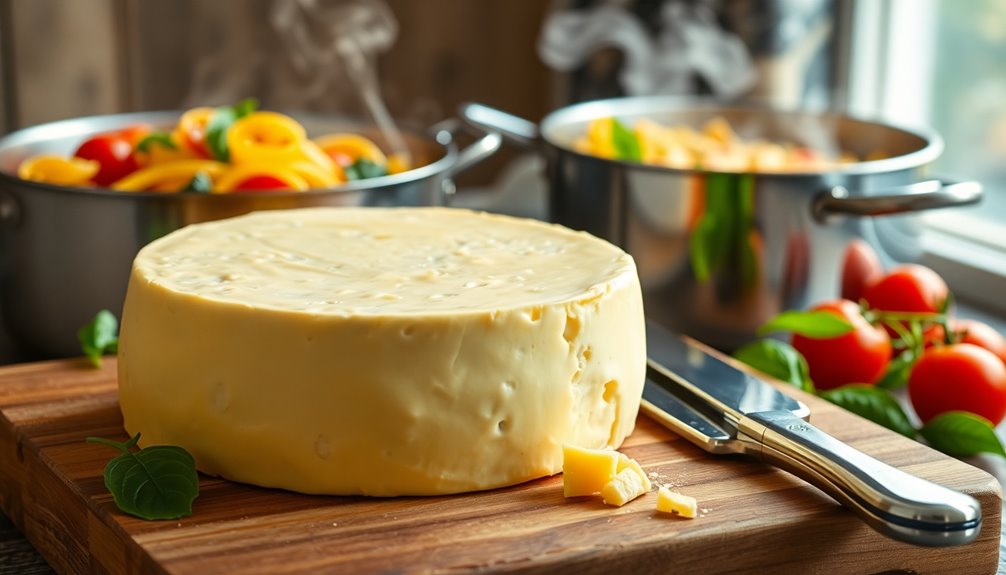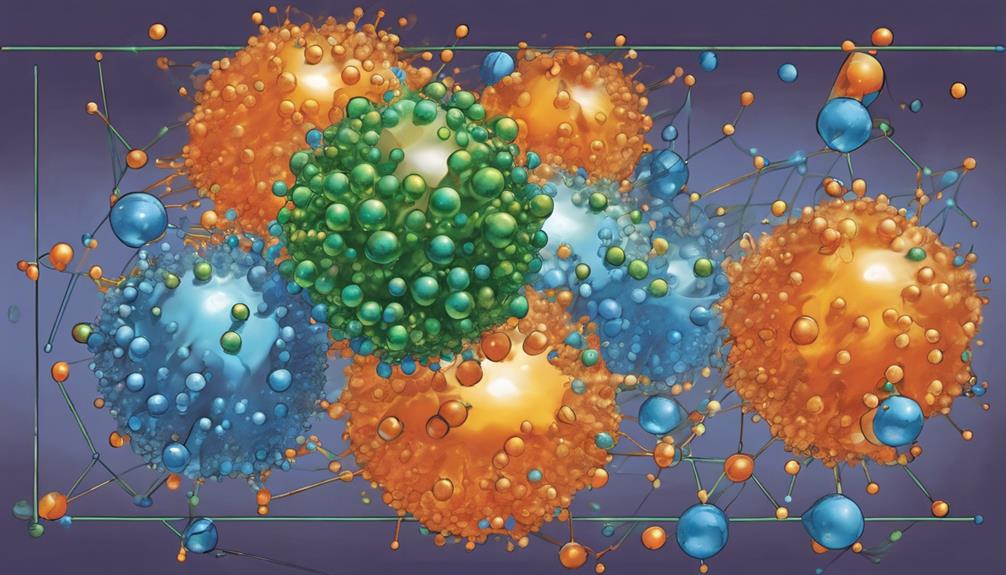Pea-derived cooking cheese delivers a delicious experience that rivals traditional cheese. It combines dairy proteins with pea protein, achieving a satisfying texture and taste. You can grill, bake, or melt it just like your favorite cheese, making it a versatile option for various dishes. With lower fat content and added fiber, it's also a healthier choice. Curious about the innovative process behind it? There's more to explore about how this cheese can elevate your meals.
Key Takeaways
- Pea-derived cooking cheese effectively mimics the texture of traditional cheeses, making it suitable for various culinary applications like grilling and baking.
- By blending dairy casein with pea protein, hybrid cheese maintains a familiar taste and texture that appeals to cheese lovers.
- Flavor enhancements through spices and seasonings help mask any legume taste, ensuring a satisfying eating experience.
- High protein content and lower fat levels make pea-derived cooking cheese a nutritious alternative without compromising on flavor.
- As consumer preferences shift towards sustainable options, pea-derived cooking cheese offers an eco-friendly choice that doesn't sacrifice deliciousness.

As the demand for sustainable food options grows, pea-derived cooking cheese is emerging as an innovative alternative to traditional dairy cheeses. You might be surprised to learn that conventional cheese production has a significant environmental impact, primarily due to dairy farming. With a rising need for sustainable cheese alternatives, researchers are focusing on pea-derived proteins, which offer a more sustainable protein source compared to soybeans.
The production process for hybrid cheese involves blending casein from dairy milk with pea protein to achieve a texture that closely resembles traditional cheese. By applying higher pressure during production, manufacturers can ensure the cheese retains its shape and moisture, thanks to the properties of pea proteins. This innovative approach allows for replacing up to 25% of milk proteins while maintaining the desired texture and flavor. Hybrid cheeses represent a promising solution for addressing the environmental impact associated with dairy consumption.
Adjustments in manufacturing processes are vital to create a product that meets consumer expectations.
From a nutritional standpoint, hybrid cheeses can provide an impressive profile by combining the benefits of dairy and plant proteins. While dairy contributes essential amino acids, pea proteins add dietary fiber, resulting in a cheese that's not only tasty but also healthier. You'll find that many pea-based products achieve high protein levels comparable to traditional dairy, often with lower fat content, making them appealing for health-conscious consumers.
When it comes to texture and taste, replicating the experience of traditional cheese can be challenging. However, the use of pea proteins effectively addresses these challenges, bringing you a product that rivals the textures of familiar cheeses like paneer. Flavor can be further enhanced by adding spices, which help to mask any legume taste, improving overall enjoyment.
As consumer preferences shift towards more sustainable options, interest in pea-derived cooking cheeses is gaining momentum. These versatile cheeses work well in various culinary applications, from grilling to baking, allowing you to savor delicious meals while making environmentally friendly choices.
Frequently Asked Questions
Is Pea-Derived Cooking Cheese Suitable for Vegans?
Yes, pea-derived cooking cheese is definitely suitable for vegans.
It's made from plant-based ingredients, primarily yellow pea protein, so you won't find any animal products in it.
This cheese not only offers a high-protein alternative but also caters to those with nut allergies.
Plus, its minimal processing aligns with your desire for less processed foods, making it a versatile and nutritious choice for your meals.
Enjoy experimenting with it in your favorite recipes!
How Does Pea-Derived Cooking Cheese Compare Nutritionally to Dairy Cheese?
Imagine switching to a plant-based diet but still craving cheesy flavors.
When you compare pea-derived cooking cheese to dairy cheese, you'll find that it often contains less saturated fat and more fiber.
For example, one serving of pea cheese might offer 6 grams of protein and no cholesterol, while dairy cheese delivers around 7 grams of protein but also comes with higher fat content.
These differences make pea cheese a heart-healthy alternative.
Can I Use Pea-Derived Cooking Cheese in Baking Recipes?
Yes, you can definitely use pea-derived cooking cheese in baking recipes.
It works well in dishes like casseroles, where melting isn't crucial.
Keep in mind that its melting behavior might differ slightly from traditional cheese, so some experimentation may be necessary to achieve your desired results.
You might also need to adjust seasonings to match the flavor of dairy cheese.
What Is the Shelf Life of Pea-Derived Cooking Cheese?
You might worry that plant-based cheeses don't last as long as traditional ones, but pea-derived cooking cheese actually has a decent shelf life.
Stored properly in the fridge, it can typically last for several weeks. Keeping it sealed and at low temperatures helps maintain its freshness.
If you want to extend its life even further, consider freezing it, though be sure to thaw it slowly in the refrigerator for best results.
Are There Any Allergens in Pea-Derived Cooking Cheese?
Yes, there can be allergens in pea-derived cooking cheese. If you have a pea allergy, consuming it may trigger reactions like hives or swelling.
Since pea protein is concentrated, it can pose a risk for severe allergic responses. Although pea allergies are less common, cross-reactivity with other legumes, like peanuts, is possible.
Always check labels, and consult with healthcare providers if you suspect an allergy to pea-derived products.
Conclusion
In conclusion, pea-derived cooking cheese proves to be a perfect plant-based pleasure, providing a delightful dining experience without compromise. You'll savor the scrumptious, savory flavors that satisfy your cravings while enjoying a guilt-free guiltless indulgence. So, whether you're whipping up a warm, comforting dish or a quick snack, this innovative ingredient is sure to shine. Embrace the enticing essence of pea-derived cooking cheese, and elevate your meals with its creamy, captivating charm!









